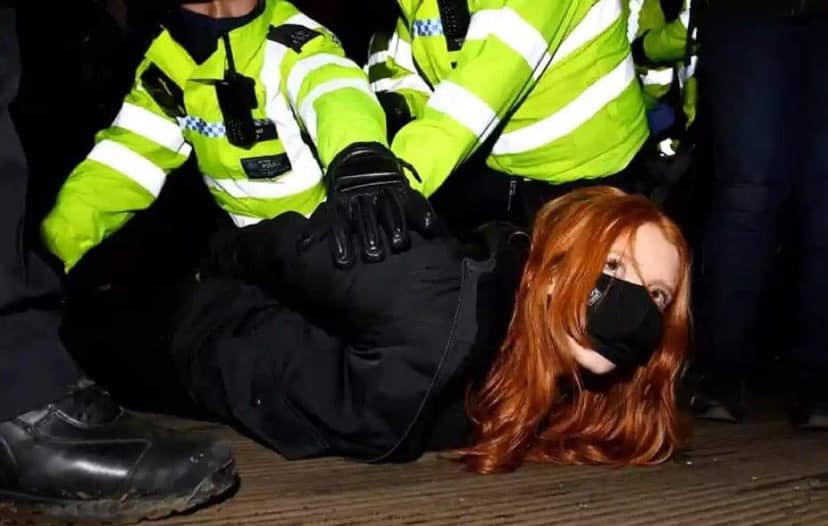
Last night (13 March 2021), hundreds gathered to remember the life of Sarah Everard and to call for changes to keep women safe in our society. The cancellation of the vigil couldn’t stop hundreds from gathering to express their emotions in the aftermath of Sarah Everard’s murder. The night ended in violence as police crushed flowers and dragged women kicking and screaming from the vigil.
Previously, the Metropolitan police had refused to allow the event to go ahead, stoking rising tensions across Britain. Tensions had started as soon as it was revealed that a serving officer had been charged with Everard’s abduction and murder.
In the wake of Everard’s death, women were told to stay at home to avoid a similar attack. This argument lays the blame of femicide and abuse at the hands of the victims of sex-based crime and largely ignores the role that men need to play in ending femicide. An explosion of discourse has seen people centering the mental health of men and how ‘not all men’ are abusers, for example. This line of argument functions to silence women’s anger and bury the role that misogyny and the patriarchy, which are necessary to sustain capitalism, has in oppressing women.
Initially people were allowed to gather around the bandstand in Clapham Common as police held back whilst a helicopter flew overhead.
These vigils come at a time when 97% of young women have reported that they’ve been sexually harassed. The murder of Sarah Everard has sparked widespread fury and has allowed women to speak on their own experiences about sexual violence.
Yet the Met police has used violence against women for everyone to see. The lack of thought for their public image demonstrates how the police know that they can perform violent acts with impunity because, as agents of the state, they will always be protected.
Four people were arrested for public order offences and for breaches of the health protection regulations.
The Met police are using the threat of Covid-19 to justify the silencing of women, keen to ignore the fact that the threat to women by the hands of men transcends the pandemic. In Merseyside, three women were killed in a single weekend in January, showing the devastating impact that the pandemic and the looming financial crisis has had on local rates of domestic abuse.
The sad irony of police violence against women remembering the life of a woman killed by a police officer has not been lost on anyone.
The Home Secretary, Priti Patel, and the London Mayor, Sadiq Khan, have said that they have both called for explanations from the Met but it is important to note that they both actively contribute to police violence through supporting the funding of the expansion of the police state. Patel has relentlessly demonised protestors since becoming Home Secretary and no report from the Met police will stop that.
Calls are being made for Cressida Dick to resign for the appalling behaviour of police officers but police violence against oppressed communities will always persist under capitalism regardless of who is Commissioner of the Metropolitan Police Service.
Many of the women now fear legal retaliation for attending what was a peaceful and socially distanced event before the police intervened.
After the events of the past week, Labour is now trying to add proposals to the Police, Crime, Courts and Sentencing Bill, including increasing minimum sentences for rapists and stalkers despite widely available statistics showing that only 1.7% of reported rapes are prosecuted in England and Wales. These reforms will do little to prevent sexual violence. We need a complete overhaul of the system so that it protects victims and stops crimes before they happen, through education and the destruction of the framework that upholds the patriarchy.
Little has been proposed by MPs to provide adequate funding for counselling services for women facing domestic abuse. Annually, the Liverpool Domestic Abuse Service has to raise 91% of its own funding. In the latest budget, Rishi Sunak, the Tory Chancellor, has promised an additional £19 million to tackle this issue but Women’s Aid estimates that £393 million is required. The majority of this government funding will most likely to be used to help the perpetrator with accommodation and future employment but insufficient funds are set aside to help women out of debt, homelessness and to find employment. The centring of men in domestic abuse cases shows how much we still have to overcome.
Under capitalism, violence against women will thrive. It is only through socialism that we can find a way towards the emancipation of women.
Georgina Andrews



